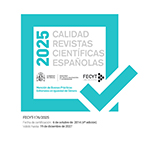Impacto de la motivación intrínseca en el rendimiento académico a través de trabajos voluntarios: Un análisis empírico
Resumen
El rendimiento académico de los alumnos es unaspecto clave para todos los agentes implicados en una educación superior decalidad. Sin embargo, no hay unanimidad sobre la forma de medirlo. Algunosprofesionales se decantan por evaluar únicamente aspectos cognitivos y otrospor la adquisición de competencias. La necesidad de que se formen profesionalescada vez más adaptados a las exigencias de las empresas y/o que puedan competira nivel internacional en un mercado de trabajo global requiere de una formaciónmás allá de conocimientos aprendidos de memoria. La capacidad de crítica, derazonamiento lógico y de redacción escrita son habilidades muy demandasactualmente en el campo de las Ciencias Sociales. Elobjetivo de este estudio es demostrar empíricamente el impacto que los trabajosvoluntarios tienen en el rendimiento académico de los alumnos. Nuestrahipótesis de partida es que los alumnos que hacen todos los trabajosvoluntarios con calidad son aquellos más motivados y, por ende, son los quesacan mejores notas. Para demostrarlo se ha realizado un experimento con losalumnos de “Financial Accounting II” del curso 2012/13 en la Facultad deCiencias Económicas y Empresariales de la UCM. Se han planteado una serie detrabajos voluntarios que suponen la elaboración de ensayos contables, con lafinalidad de desarrollar habilidades y competencias en materias complementariasa las valoradas en el currículo de la asignatura. Al final del curso, se hacomparado tanto la realización o no del ensayo como su calidad crítica,reflexiva y de redacción. Losresultados obtenidos demuestran una relación entre los trabajos de calidadpresentados voluntariamente y la nota final de la asignatura. Esto supone quela motivación intrínseca del alumno es un elemento clave para su rendimientoacadémico. El rol del profesor se focaliza en ser un elemento motivador delaprendizaje.Descargas
Descarga artículo
Licencia
La Revista Complutense de Educación, para fomentar el intercambio global del conocimiento, facilita el acceso sin restricciones a sus contenidos desde el momento de su publicación en la presente edición electrónica, y por eso es una revista de acceso abierto. Los originales publicados en esta revista son propiedad de la Universidad Complutense de Madrid y es obligatorio citar su procedencia en cualquier reproducción total o parcial. Todos los contenidos se distribuyen bajo una licencia de uso y distribución Creative Commons Reconocimiento 4.0 (CC BY 4.0). Esta circunstancia ha de hacerse constar expresamente de esta forma cuando sea necesario. Puede consultar la versión informativa y el texto legal de la licencia.











